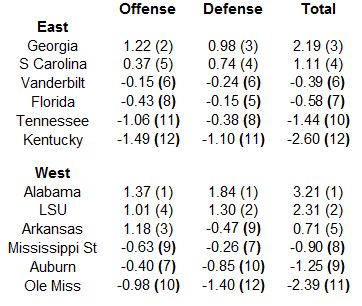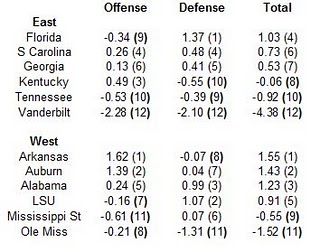Let me preface this by saying that any proposal which Stewart Mandel refers to in a self-congratulatory way as the “Mandel Plan” is inherently suspect, but I can’t help being impressed by the sheer cynicism of this:
… Multiple sources with direct knowledge of last week’s discussions in South Florida have confirmed to SI.com that the new favored proposal for a four-team playoff within the bowl system would place the two semifinal games at the traditional anchor bowls of the No. 1 and 2 teams’ conferences…
… Two new bowls (one of them presumably the revitalized Cotton Bowl) would join the four existing BCS bowls as part of a six-game television package, with a goal of playing all six on Dec. 31, Jan. 1 or Jan. 2. The commissioners have talked for some time about “reclaiming New Year’s Day” and eliminating mid-week games played as late as Jan. 5. Assuming the current bowls retain their present anchor conferences (Big Ten and Pac-12 in the Rose, SEC in the Sugar, Big 12 in the Fiesta, ACC in the Orange), the two new games could serve as semifinal sites should the No. 1 and 2 teams hail from, say, the Big East and Mountain West — or, like last season, from the same conference.
BCS Executive Director Bill Hancock said definitively last week that automatic qualification status for conferences “will not continue,” but that doesn’t mean the bowls can’t individually continue their traditional relationships with certain conferences. However, in order to ensure all six games contain compelling matchups, teams would have to meet a minimum ranking (perhaps Top 15), and the teams-per-conference limit would be raised from two to three, said one source. While this stands to primarily benefit the major conferences, the limited pool would make it hard for one of the bowls to pass up, say, seventh-ranked Boise State.
Call it the “Revenge for Making Schools Buy All Those Seats” Plan. Because if you think the SEC is going to maintain its long-standing relationship with the Sugar Bowl merely out of a sense of tradition, well, I’ve still got that beachfront property in Hahira for sale. The bowls will have to pay to play – and they’ll have to do it with people like Jerry Jones in the mix. That’s gonna cost.
You’ve got to love how this gets spun. To the fans who want the convenience and the passion that would come with the top-seeded schools hosting the national semi-final games, the commissioners can solemnly explain how sacred the bowls are and how important it is to keep those alliances, without having to mention how much more profitable those games are likely to be than if they were on-campus – after all, you can’t really shake down the schools the way you can shake down the bowls. And the bowls are being given the chance to stay relevant in the college football postseason, albeit at a price. If they don’t choose to pay… er, play, well, that’s their choice.
That it’s also a nice bone to toss in Jim Delany’s direction, since it gives him the opportunity to save the special relationship his conference has with the Rose Bowl, should give you a rough idea who’s come up with it. I don’t know if they’ll succeed, but it sure is a sharp idea.




